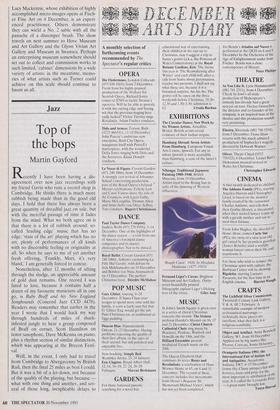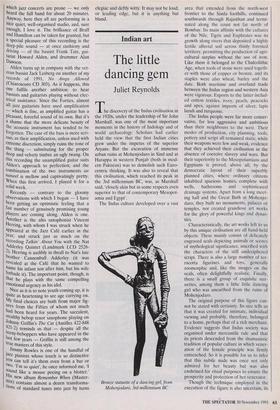Jazz
Top of the bops
Martin Gayford
Recently I have been having a dis- agreement over new jazz recordings with my friend Gavin who runs a record shop in Cambridge. He thinks there is much more rubbish being made than in the good old days. I hold that there has always been a great quantity of dreadful jazz on sale, but with the merciful passage of time it fades from the mind. What we both agree on is that there is a lot of rubbish around: so- called 'leading edge' music that has no edge; 'state of the art' playing which has no art; plenty of performances of all kinds with no discernible feeling or originality at all. So when he says to me of yet another fresh offering, 'Frankly, Mart, it's very bland,' I am generally forced to concur.
Nonetheless, after 12 months of sifting through the sludge, an appreciable amount of gold dust remains. One record I was fated to love, because it contains half a dozen of my favourite musicians all in one go, is Ruby Braff and his New England Songhounds (Concord Jazz CCD 4478). Readers may remember that earlier in the year I wrote that I would hack my way through hundreds of miles of shark- infested jungle to hear a group composed of Braff on cornet, Scott Hamilton on tenor saxophone, Dave McKenna on piano, plus a rhythm section of similar distinction, which was appearing at the Brecon Festi- val.
Well, in the event, I only had to travel from Cambridge to Abergavenny by British Rail, then the final 25 miles as best I could. But it was a bit of a let-down, not because of the quality of the playing, but because what with one thing and another, and sev- eral of those long, inexplicable delays to which jazz concerts are prone — we only heard the full band for about 20 minutes. Anyway, here they all are performing in a nice quiet, well-organised studio, and, sure enough, I love it. The brilliance of Braff and Hamilton can be taken for granted, but a special pleasure of this recording is the deep-pile sound — at once cushiony and driving — of the bassist Frank Tate, gui- tarist Howard Alden, and drummer Alan Dawson.
Alden turns up in company with the vet- eran bassist Jack Lesberg on another of my records of 1991, No Amps Allowed (Chiaroscuro CD 303). As it happens, this one fulfils another ambition: to hear bassists and guitarists playing without elec- trical assistance. Since the Forties, almost all jazz guitarists have used amplification — which is fine, as amplified guitar has a Pleasant, forceful sound of its own. But it's a shame that the more delicate beauty of the acoustic instrument has tended to he forgotten. The case of the bass is more seri- ous, as their amplification, unless used with extreme discretion, simply ruins the tone of the thing — substituting for the proper deep and velvety timbre an ugly twang. On this recording the unamplified guitar suits Alden's approach to perfection; and the Combination of the two instruments au nature! is mellow and captivatingly pretty. When this first arrived. I played it for a solid week.
Recently — contrary to the gloomy observations with which I began — I have been getting an optimistic feeling that a fair number of genuinely promising young Players are coming along. Alden is one. Another is the alto saxophonist Vincent Herring, with whom I was struck when he appeared at the Jazz Café earlier in the Year, and struck just as much on the recording Talkin' About You with the Nat Adderley Quintet (Landmark LCD 2528- 2). Herring is audibly in thrall to Nat's late brother Cannonball Adderley (it was revealed at the Café that he wanted to name his infant son after him, but his wife forbade it). The important point, though, is that he plays with the same compelling emotional urgency as his idol. Nice as it is to note youth coming up, it is quite as heartening to see age carrying on. My final choices are both from major fig- ures from the Fifties of whom not much had been heard for years. The succulent, stealthy bebop tenor saxophone playing on Johnny Griffin's The Cat (Antilles 422-848 421-2) reminds us that — despite all the teeny-beboppers who have appeared in the last few years — Griffin is still among the true masters of this style.
Jimmy Rowles is one of the handful of jazz pianists whose touch is so distinctive You can tell it's them even from a bar or two. 'I'm so quiet', he once informed me, 'I sound like a mouse peeing on a blotter.' His new album Remember When (Master- mix) contains almost a dozen transforma- tions of standard tunes into jazz by turns elegiac and deftly witty. It may not be loud, or leading edge, but it is anything but bland.











































































 Previous page
Previous page